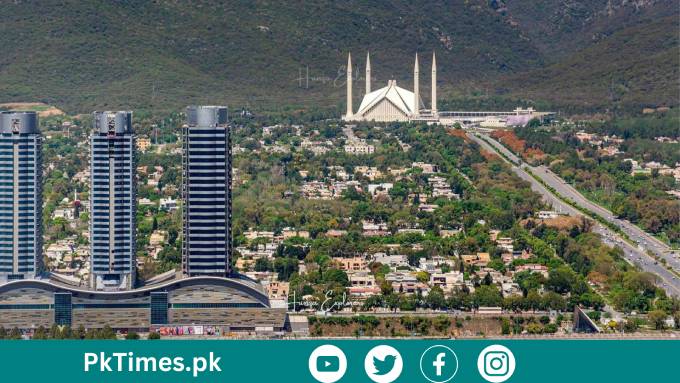Exploring the Capital City: Nestled in the heart of Pakistan lies its political nucleus, a city that serves as the epicenter of governance, diplomacy, and cultural convergence. As we embark on this journey, we peel back the layers of history and modernity to uncover the essence of Pakistan’s capital city, Islamabad. Join us as we delve into the rich tapestry of this dynamic metropolis and unravel its significance in shaping the nation’s political landscape.
Historical Background of Pakistan’s Capital
The story of Islamabad’s rise to prominence is intertwined with Pakistan’s tumultuous history. Following the partition of British India in 1947, Karachi served as the capital of Pakistan. However, in the 1960s, a decision was made to establish a new capital that would symbolize the unity and aspirations of the nation. Thus, Islamabad was born, a meticulously planned city set against the backdrop of the Margalla Hills, embodying the vision of Pakistan’s founding fathers.
Islamabad: The Modern Capital of Pakistan
Today, Islamabad stands as a testament to modernity and progress, with its wide boulevards, green spaces, and iconic landmarks. Designed by renowned Greek architect Constantinos Apostolou Doxiadis, the city boasts a blend of Islamic and contemporary architectural styles. From the majestic Faisal Mosque to the sprawling Shakarparian Park, Islamabad’s beauty captivates visitors and residents alike, offering a serene retreat from the hustle and bustle of urban life.
Significance of Islamabad in Pakistani Politics
As the political nerve center of Pakistan, Islamabad plays a pivotal role in shaping the nation’s destiny. It is home to key government institutions, including the Parliament House, Supreme Court, and Prime Minister’s Secretariat. Additionally, Islamabad hosts a myriad of diplomatic missions, fostering international cooperation and dialogue. The city’s political landscape pulsates with the energy of decision-making, as policymakers and diplomats converge to chart the course of the nation’s future.
Comparing Islamabad to Other Pakistani Cities
While Islamabad exudes modernity and grandeur, it stands in contrast to Pakistan’s historical cities, such as Lahore and Karachi. Unlike the ancient heritage of Lahore’s walled city or Karachi’s bustling streets, Islamabad’s planned layout reflects a vision of progress and efficiency. Yet, each city holds its own charm and significance, contributing to the diverse tapestry of Pakistan’s cultural landscape.
Cultural and Social Dynamics of Islamabad
Beyond its political realm, Islamabad is a melting pot of cultures, languages, and traditions. Its diverse population reflects Pakistan’s multicultural fabric, with residents hailing from all corners of the country and beyond. From vibrant markets to cultural festivals, Islamabad offers a kaleidoscope of experiences that celebrate the richness of Pakistan’s heritage.
Economic and Infrastructural Development in Islamabad
Economically, Islamabad serves as a hub of commerce and industry, with sectors such as IT, finance, and hospitality driving its growth. The city’s infrastructure continues to evolve, with ongoing development projects aimed at enhancing connectivity and livability. However, challenges such as rapid urbanization and environmental sustainability remain pressing concerns that require careful planning and management.
Future Prospects and Challenges for Islamabad
Looking ahead, Islamabad holds boundless potential for continued growth and prosperity. As Pakistan navigates the complexities of the 21st century, Islamabad will play a crucial role in shaping its trajectory. However, challenges such as urban sprawl, infrastructure development, and environmental degradation must be addressed to ensure a sustainable future for the capital city.
Conclusion
In conclusion, Islamabad stands as a testament to Pakistan’s resilience, progress, and vision for the future. As we peel back the layers of history and modernity, we gain a deeper appreciation for the significance of this vibrant city. From its political corridors to its cultural landmarks, Islamabad embodies the spirit of Pakistan, serving as a beacon of hope and possibility for generations to come.
Read more: how many states in Pakistan
FAQ’s
1. What is the significance of Islamabad as the capital of Pakistan?
Islamabad holds immense significance as the political and administrative center of Pakistan. It houses key government institutions such as the Parliament House, Supreme Court, and Prime Minister’s Secretariat, making it the hub of national governance. Additionally, Islamabad serves as a diplomatic hub, hosting numerous foreign embassies and diplomatic missions. Its strategic location and well-planned infrastructure underscore its importance in shaping Pakistan’s political landscape and fostering international relations.
2. How does Islamabad compare to other major cities in Pakistan, such as Lahore and Karachi?
While Islamabad is known for its modernity and planned layout, it differs significantly from Pakistan’s historical cities like Lahore and Karachi. Lahore, with its rich cultural heritage and Mughal-era architecture, is often considered the cultural capital of Pakistan. Karachi, on the other hand, is the country’s economic powerhouse, known for its bustling streets, diverse population, and vibrant commercial activities. While each city has its own unique charm and significance, Islamabad stands out for its modern infrastructure, green spaces, and role as the political center of the nation.
3. What are some of the key landmarks and attractions in Islamabad?
Islamabad is home to several iconic landmarks and attractions that showcase its beauty and significance. One of the most prominent landmarks is the Faisal Mosque, one of the largest mosques in the world, renowned for its striking modern design and vast prayer hall. The Margalla Hills National Park offers breathtaking natural scenery and outdoor recreational opportunities, while Shakarparian Park provides panoramic views of the city. Other notable attractions include the Pakistan Monument, Lok Virsa Museum, and Rawal Lake, all of which contribute to Islamabad’s allure as a modern and cosmopolitan capital city.


